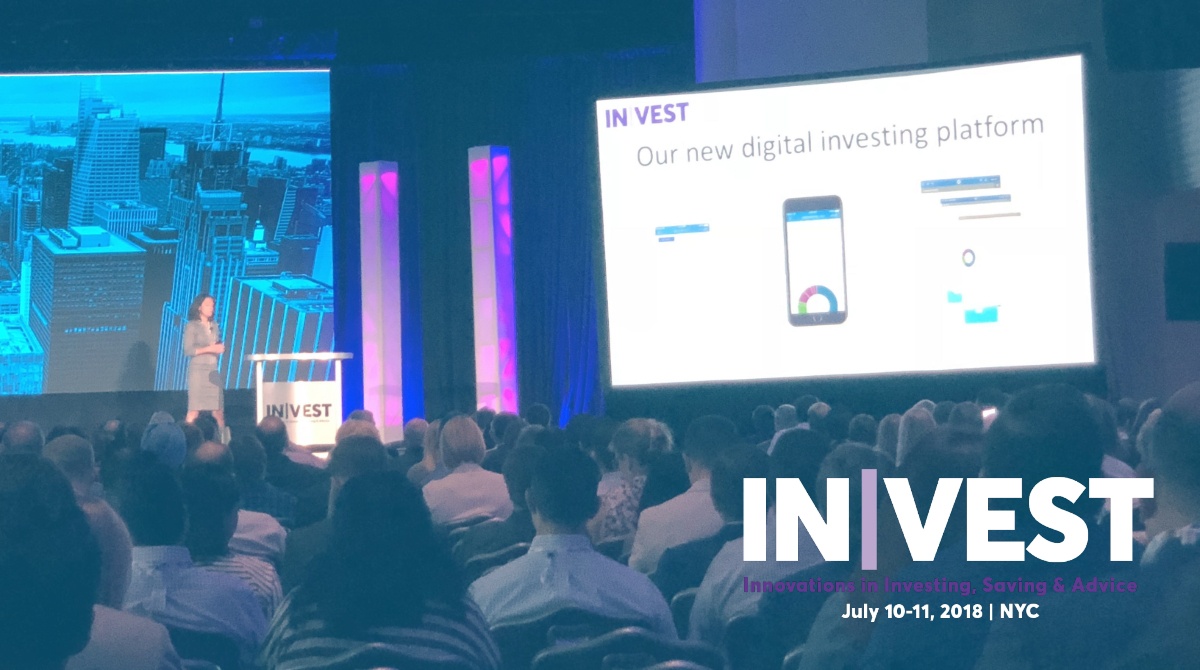Four trends we picked up from our sidebar conversations

Last week, we attended the In|Vest 2018 conference in New York and presented a demo of our system during the “Disrupt|Demo” sessions. Our schtick: we showed how to rebalance an entire book of business in six minutes, with every portfolio getting high levels of customization and optimized tax management. I’m pleased to report the demo was well received.
Like all conferences, there was as much going on in the hallways as in the meeting rooms. Perhaps even more than usual. We wish we could report what the presenters and panelists said — we hear they were great — but we ended up spending most of our time in sidebar conversations. So, instead, we’ll share some of the scuttlebutt we picked up.
Asset Managers Becoming SMA/UMA Providers
This trend is real. Multiple asset managers are working on becoming SMA/UMA managers. They look at outsourced overlay firms like Parametric Portfolios and Aperio as their model. Some explicitly. Their goal is to move up the value chain by:
- Taking on an “outsourced CIO” function, offering guidance on asset allocation and product selection.
- Acting as a subadvisor and rebalancing portfolios.
- Providing high levels of customization and tax management.
- Becoming more nimble in rolling out new products.
This last point, about being more nimble, is worth stressing. With an SMA/UMA delivery structure in place, launching a new strategy is as simple as creating a new model. Launching a new mutual fund takes months, but a new model to guide SMA/UMA accounts can be created in a day. In the extreme, asset managers can create custom models for each client, supporting “dial a strategy” functionality.
We’ve written about asset managers becoming SMA/Managers before. (See Asset Managers Pivot to Sell Solutions, Not Just Product, Robo SMAs will Replace Mutual Funds, Q&A: Robo SMAs Will Replace Mutual Funds, and A Long Tail Strategy for Asset Managers.)
New Robos
Robos are not last year’s news. Despite the struggles of some of the independent robo advisory firms, more are being launched. There are some interesting niche offerings, like Kindur, that are explicitly going after older and/or wealthier investors. And, notably, we’re seeing robos being developed by large companies outside the normal wealth management space, with very large consumer exposure. Think credit card and insurance companies — and companies that don’t even provide financials services. This is getting interesting.
The Role of the Advisor is Changing
Advisors add more value by acting as a coach and planner than by picking stocks or rebalancing portfolios. And tax management is going from a nice-to-have to a must-have. ESG is close behind. These are not new ideas, but we’re seeing more firms actively shoring up their offerings. It means centralizing the rebalancing function in a way that supports high levels of customization and tax management. (See An Inside Look at Automated Rebalancing Systems and Automated Rebalancing & Specialization.)
A Decline of RFPs?
One oddity we picked up on is an apparent decline of RFPs. We spoke to large firms that were planning to skip RFPs for some of their current projects. We’re not sure if this represents a temporary oddity or a real trend, but we hope it’s real. Almost no one we speak with — vendors or buyers — think standard RFPs are all that useful. They’re a lot of work for both sides, but often skirt the really important issues in favor of technical details.
In the place of RFPs, we’re seeing firms spend more time investing basic architectural decisions: Do they want to adopt a sleeve-based or holistic approach? Will they use models? Etc. Or, if they do issue RFPs, they’re going to keep them simple, e.g. they’ll ask open questions like: “This is what we’re trying to do…. how can you help us?” (See A Guide to Choosing a Rebalancing System.)
More… of Everything
This was one of the highest energy conferences we’ve ever attended. There were more conversations between wealth management firms and vendors, and between vendors. And the conversations were “action oriented” — geared towards finding ways to solve specific problems. All in all a good conference. Hats off to Sourcemedia, who organized the event, and to all who attended.


COMMENTS